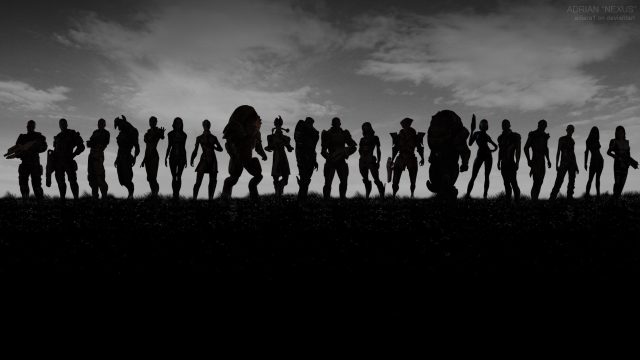
369 hours.
That's nine 40-hour work weeks of time spent in the Mass Effect universe, according to the combined reports of Steam, Origin, and my creaky old Xbox 360. Eighty-six hours went into the original Mass Effect (three playthroughs), 189 hours into Mass Effect 2 (six playthroughs), and 94 hours into Mass Effect 3 (three playthroughs).
Commander Shepard and his crew—sometimes her crew, but we'll get to that—have done plenty of galaxy saving under my control. They fought aliens, robots, clones, politicians, and reporters. They stood united against enemies vast and unknowably timeless. They have, in the words of James T. Kirk, "been through death and life together."
They're my friends.
OK, they're not really my friends; claiming to be buddies with imaginary characters is a little too geeky even for me. The Mass Effect series is not without its flaws, and some are truly Reaper-sized. But it has gripped me like nothing else in the history of video games, and video games and I go back a pretty long way.
As the first anniversary of Mass Effect 3's release approached in early March, I embarked on an epic playthrough of the entire Mass Effect series. My goal was not just to finish all three games but to see if I could actually role-play a character through the series. I wanted to take an angry, win-at-all-costs Commander Shepard and transform him through fire into a caring, compassionate leader who values the means as much as the ends. I found this to be both easier and far, far more difficult than I imagined.
Each game takes at least 30 hours to play properly, so I did a lot of my playing in eight to 10 hour stretches on weekends. My wife is sick of hearing me describe scenes and characters to her, but honestly, as the closing notes of "Farewell and Into the Inevitable" echoed through my headphones, I found myself sadder about the end of the epic three-game playthrough than I expected to be. Mass Effect is just that good, and I want to tell you why. It might not be for the reasons you're expecting.
A note about spoilers: This piece is going to be filled front-to-back with spoilers from all three games. We'll talk about plot arcs and choices, the fates of the characters, and the endings. By the time we're done, we'll have touched on tons of stuff across the entire series. If you haven't played the games but still want to, this will kill a whole lot of the mystery and anticipation. This is your first and only warning!
Infinity and beyond
The Mass Effect universe is that rare thing—a fully-realized science fiction game setting that stands up to the likes of Star Trek or Star Wars. The universe in which the games take place has a rich and complex backstory, and even better, it's not a rich and complex back story that the player has to have info-dumped into his head. This isn't The Old Republic, where you have to read thousands of awful Kevin J. Anderson "Extended Universe" novels and have a working knowledge of the seven prime forms of lightsaber combat to get the most out of the game.
There's depth in the backstory, but it's not the kind of depth that ever compelled me to memorize the game's codex entries. (Do you really need to know that the "First Contact War" between humans and Turians started because humans activated a mass relay in violation of council law and that the war culminated in the siege of Shanxi? No. It's wonderful flavor, but it's not mandatory knowledge.) The world is alive and compellingly real just through dialogue and character actions, without needing endless narration. The first game's opening title crawl essentially says, "This is the future and aliens are real and you are a space soldier. Go." That's enough.
Instead of a galactic civics lesson, Mass Effect focuses on a human, the forever-first-nameless Commander Shepard, and his fight against the ancient Reapers, an enemy that aims to rid the galaxy of advanced sentient life for a whole bunch of really complicated reasons. That fight is the central focus of all three games, though Shepard's path from soldier to savior twists and turns and doubles back on itself like a demented snake.
The feel of the Mass Effect universe permeates every scene, and in that way it feels a lot like other good Bioware games. In Knights of the Old Republic, for instance, you never forgot you were in Star Wars—the sounds, the colors, the costumes, the look and feel of each room and character were all carefully tuned. Mass Effect is the same. The future is a cool blue neon with glowing flecks all around it. Orange and yellow and green floating computer screens and omni-tools. People and aliens all dressed head to toe in form-fitting slickness. And curves everywhere—the future is dominated by curves, from the Mass Effect logo down to every nook and cranny on every spaceship.
reader comments
300